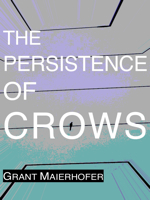THE SKY CONDUCTING
Michael J Seidlinger {lives here}
Civil Coping Mechanisms, 2012
For this review I didn’t write marginalia. I didn’t want to weigh the book down. The book already supported enough weight on its own, a remarkable feat considering it didn’t use many words. Must be a question of design: it felt as if when I wanted to move on to the next page I was moving on to the next page. This book has little to no drag, either that or a lot of empathy.
I didn’t write marginalia, but I did take notes in my notebook. I’d say most of my writing happens inside these notebooks. Several times I’ve tried writing novels in these notebooks, but that gets messy. Now these notebooks shelter my book reviews.
THE SKY CONDUCTING doesn’t feel like it was written in a notebook. Maybe parts of it were scrawled on paper to aid Seidlinger’s memory, could be, but I picture the process being different, less plebeian. The writing happened in his sleep, played against the back of his eyelids, whole paragraphs that stayed with him into his waking life. Seidlinger knows how to mix a drink that will result in nightmarish dreamscapes and a heightened sense of awareness. It’s his trick of the trade.
What this book made me do is think more about things I haven’t thought about but feel like I should’ve already thought about if I were more ponderous, or if I were a more informed global citizen.
* * *
Most of my notes are quotations. Some are opinions. There’s one note that I no longer agree with, and, to be honest, I cannot recall why I wrote it. Early on in my notes I write, “Maybe a different POV would work better.”
In hindsight this doesn’t make sense to me. There’s no way the narrator of this book should be altered. The narrator — this third-person present-tense sensory organ conducting in the sky — facilitates the narrative with perfect pitch, that is, once you get past the opening pages, which serve more as exposition, or even a rant about America’s discontents. I feel like the opening pages do more telling than showing. It was while reading these vague and generalized pages that I made that note, a note that now, after having read the book, I no longer agree with.
The furniture tried so hard to match but always seemed two trends behind. The trends had shifted and the nuclear family would hold onto this one for decades to come.
Seidlinger is trying to do something that’s not easy to do. In telling the story of this particular nuclear family, with its father and mother, its son and daughter, he wants to tell the story of every nuclear family too: every father, every mother, every son, every daughter.
To a certain extent he pulls this off, but at a cost, for the story didn’t really grab me until each member of the nuclear family got a personality and mission of their own, leaving the cynical pontificating behind for increasingly longer spans of time.
The father the daughter the son ignores the mother’s demands.
After reading this sentence, I wrote in my notebook, “Interesting how the father the daughter the son make a singular entity. It ignores the mother’s demands.”
* * *
Then we meet Johan and the story gains momentum.
Once you get there, events in THE SKY CONDUCTING happen in a beautiful tumble, building a world that is abandoned, barren, and overgrown with nature yet distinctly suburban in that there’s still a sheen to the landscape, but not in a glossy way. The gloss is gone, sanded off. All that remains is a matte surface ready to be absorbed into the earth.
Johan, a non-American, is a memorable character. He pulses with life from the start and has a sly way of making simple observations. Tautological sentences like, “Different places make people so very different,” when issued in Johan’s voice, take on the weight of wisdom.
Here’s another of Johan’s pearls, “But an animal cannot help but try and survive. An animal knows no death or suicide. An animal survives. It is the way.”
* * *
Throughout the narrative there’s the unanswered question: How did America die while no one was looking? Seidlinger says it was a heart attack that did it, but how does a civilization have a heart attack? I got no clear idea of how many people were still around or how many Americans were left in the same position as the nuclear family. The same kind of vagueness that comes with referring to his characters in terms of their roles rather than their proper names spills over into this apocalyptic America. Vague and featureless like nearly forgotten dreams.
The narrator tells us that windows in houses are boarded up. But who boarded them and why? Did people know the end of America was coming? And how did the end happen when no one was looking? Because the windows were all boarded up? I’m not even sure these questions are important. There’s something else that matters more. An idea at the center.
In his review of Edward Mullany’s IF I FALTER AT THE GALLOWS, Mel Bosworth says there is the potential for violence in Mullany’s tiny poems. I feel like the same can be said about THE SKY CONDUCTING. Like when the daughter holds the pickaxe and threatens to use it as a weapon against Johan, there really is tension, something violent and descriptive could happen.
Seidlinger kept me on my toes, clinging to his words, wondering what kind of massacre I was headed toward. As with the death of America, the motives of his characters are unsettling in their vagueness, and this makes everything dangerous. Paranoia abounds.
* * *
It’s rare that a historian has enough information to explain how survivors of one civilization can be incorporated into civilizations still-thriving.
After reading this I fashioned my thumb into a placeholder, closed the book, and stared at the ceiling. What happened to Romans after the fall of Rome? And if America (the USA) falls, what will happen to the people from the USA? For some reason I never posed this question. The nuclear family’s daughter, however, gives Johan a possible answer. She says she’ll always be American. They weren’t meant to thrive anywhere else. They were born on this rock and they are meant to die on it.
Seems like a parochial stance if you were to ask me, full of nationalism and the stuff of conflict. I don’t really like this answer. I don’t think the nuclear family likes it either. They are ready to leave ‘this rock’ and start a new life elsewhere. They’re no more American than anyone else. They’re people, persons. That’s it.
Getting back to the idea at the center of THE SKY CONDUCTING. One word: culture. Excuse me if I stumble, but I think this book is a great meditation on what it means to be American or, for that matter, any other nationality. On the one hand, culture is something people make. On the other hand, culture is something people are born into. In the case of America, a relatively young civilization, culture is constantly be manufactured. People aren’t born into it. They have to make it and they have to buy it to guarantee it will continue to be made. Our economy fuels our culture, not tradition or history or spirituality. This makes America’s culture tenuous at best. Our culture isn’t a concrete idea. It’s abstract. It’s vague. It’s at risk of being lost or hijacked. This book says America died, but it didn’t really die, it just got absorbed.
MY RATING = ![]()
![]()
![]()
![]()
![]()










